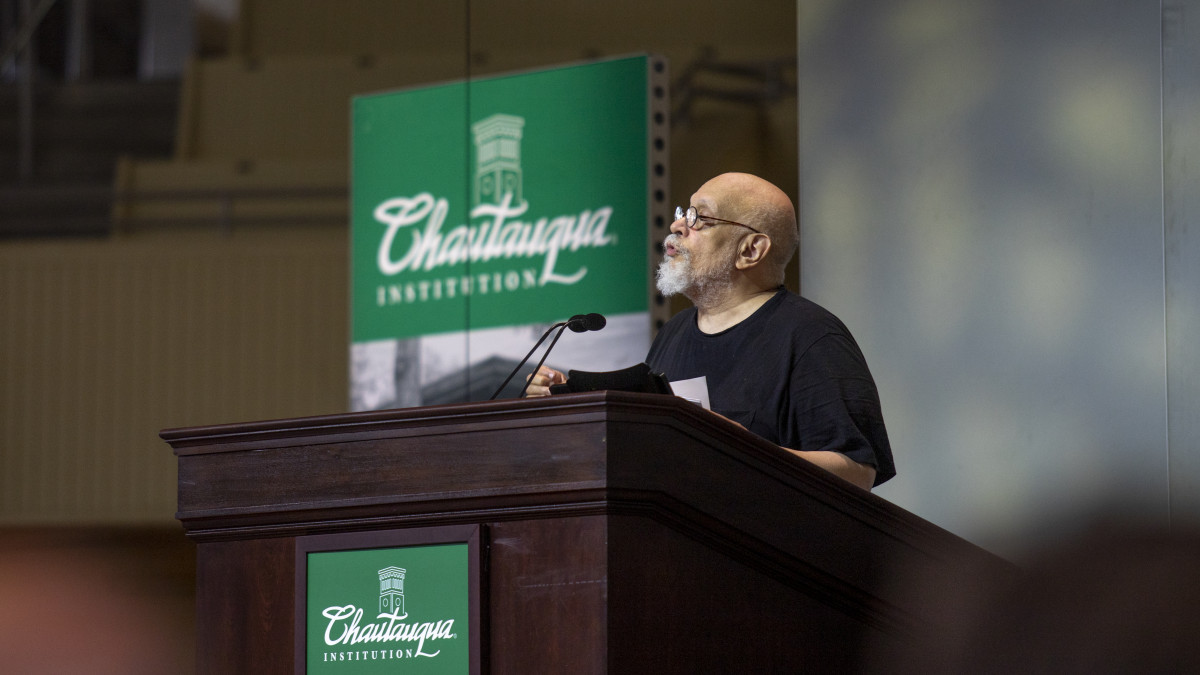Many people see technology as the gateway to the future, but mystery writer Walter Mosley believes that humans are ultimately heading toward an alluring mirage — a facade with a bright light — that is leading society into a dystopian world of darkness.
“Darkness is inside of us, yet we are unaware of it,” he said, “darkness that on a bright and sunny day, hides the truth from our eyes. … The world we think we know, knows us better. The truth is that we live mostly in darkness. Even on a bright and cloudless day, the things most important to us remain hidden.”
Mosley gave the final lecture of the Chautauqua Lecture Series Week Six theme, “After Dark: The World of Nighttime,” on Friday, Aug. 5 in the Amphitheater. Mosley is perhaps best known for his Easy Rawlins mystery series, in which he documents the African American experience from the deep South to the post-Obama era in New York City. Throughout his career, he has written more than 55 books, ranging all the way from crime novels to literary fiction, to nonfiction and political essays.
Instead of talking about his profession, he decided to speak to Chautauquans about the themes of darkness and night. He believes that the two words can carry multiple connotations, depending on their usage.
“The concept of night cannot be pinned down because it doesn’t mean one thing,” he said. “We can see this in the many phrases used today that contain the word — fly-by-night, night owl, one-night stand, good night, two ships passing in the night, the night is young, and burning the midnight oil.”
In his talk, however, he referred to darkness and night as the “unknowns.” He explained how humans have developed an intense fear of uncertainty — of “what they don’t know” and of beliefs that challenge their existing ways of seeing the world.
He distinguished between two different types of darkness — one that is unconscious and uncontrollable, and another that is avoidable and technologically self-induced.
One of the darknesses he mentioned is the human discomfort with subversive beliefs and elements, which he believes has led to widespread social issues, including political polarization.
“The desire to eradicate any notion that interferes with the ideas of ourselves is paramount when we feel threatened on a global scale,” he said. “Many members of the left interpret words long ago as if they were uttered in opposition to today’s aesthetic. … In much the same way, today, members of the right misinterpret the meaning of concepts like Critical Race Theory in an attempt to protect themselves from being humiliated by their own history.”
Humans have repeatedly sought out ways to come to terms with the unknown darknesses of life, such as death, aging and the passage of time. While clocks and other man-made creations are often used to cope with these uncertainties, he emphasized that time, which he referred to as a “source of modern distress,” is not actually quantifiable. Rather, it is a completely human concept.
“As children, we were all taught that time existed on a circular disk that was broken into 12 numbers representing 24 hours and 700 tiny increments,” Mosley said. “These hours and minutes are all equidistant, inferring that the passage of time between each indicator is also equal. We were taught that, in essence, time is an absolute and we can trust it to pass equally for all.”
But time does not pass evenly, he said, and then cited the rapid growth of digital technologies since World War I.
“All the way back to the beginning of human awareness, knowledge grew by 100% every 100 years or so,” he said. “… Before World War I, from one generation to the next, there was very little difference in how we were connected through technology and resulting technique, with bows and arrows, ironwork, agriculture, and other uniquely human modes of labor remained little changed in a century. … (Now) it doesn’t take five generations for knowledge to double. It doesn’t take a century, only somewhere around a year.”
With such immense changes, comes an increase in the velocity of time.
“A threat, or simply a challenge,” Mosley said; he believes this rush is causing society to plunge further into the apocalypse of darkness.
“These (technologies) are the intelligent parasites that control our hearts and minds,” he said. “… Even the physical systems of the Earth itself are deeply impacted by our economy and our technologies, but like any intricately involved parasite, these systems subtly and unconsciously take over our lives and bid us to the will of an inhuman system. It is the theme of many science fiction novels and movies, that a league of super-intelligent computers will one day soon take over. … As you may be able to tell, I believe in this apocalyptic prophecy.”
While many people believe that technology is aiding their lives, Mosley said that it may be actually dictating them, whether they are conscious of it or not. He referenced Sigmund Freud’s theory of hysterical blindness, which posits that an individual may consciously prevent themselves from seeing the dangers of a situation.
Mosley believes humans are becoming small parts in a large technological machine, and urged Chautauquans to reconsider their usage of digital innovations in an attempt to open and enlighten their eyes.
“Systems of trade and technique have blinded us to anything except their own glittering promise. And so, darkness — that which is hidden from sight. We live within systems that hide away from perceptions,” Mosley said. “We believe we are freely making decisions. … This, I believe, is the curse of night on humanity.”
Because of this, we’ve become a curse on the flora and fauna of this world, he said, and abandoned philosophical thought.
“We have lost our connections in this forever night, and until we are reunited, the sun will not rise,” Mosley said.





